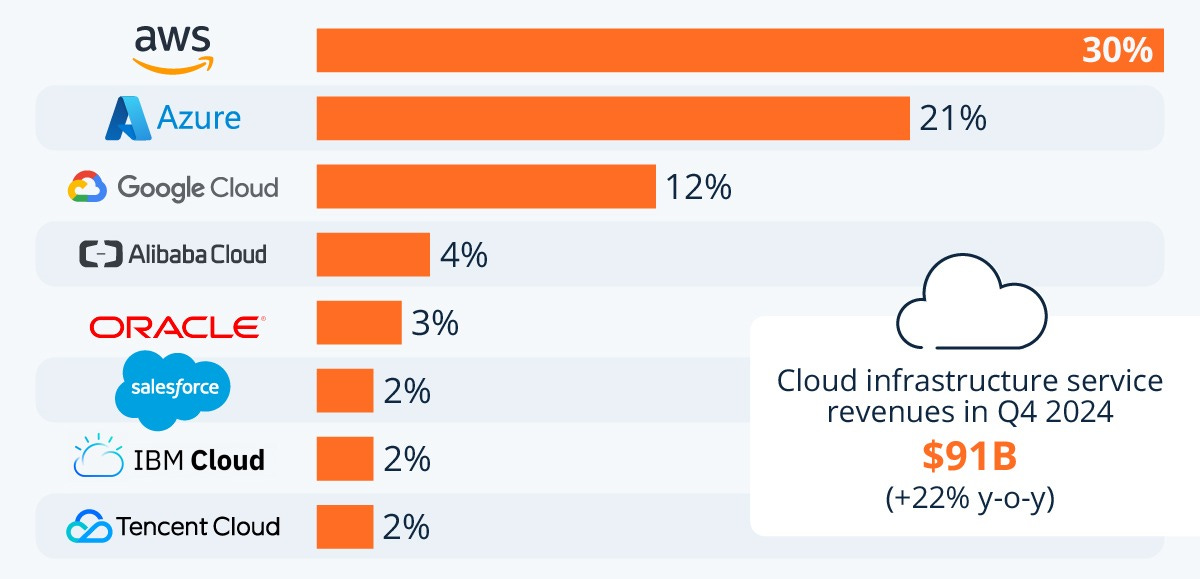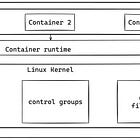How to become a Great Cloud Engineer
Inside the issue, resources, skills, tools, and mindset to be successful in cloud.
DevOps Guide to delivering and securing APIs online (Sponsored)
If you've ever wasted an afternoon messing with port forwarding, firewalls, or cloud configs just to share an API, yeah—same. ngrok makes it dead simple to expose your API to the internet, securely, in seconds. No config dumps. No infra overhead. Just your app, online.
Get those APIs online with ngrok's guide
Hi—this is Kisan from The Cloud Handbook. Each week, I write about Cloud, DevOps, Systems Design deep dives and community update around it. If you have not subscribed yet, you can subscribe here.
With 94% of enterprises already using cloud services and the global cloud market projected to reach $3.5 trillion by 2035, the demands for cloud professionals are growing more than ever.
Cloud is no longer the future — it's the present. But what makes a great cloud engineer in today's ever changing world?
In this article, we are going to talk about some of the skills and mindset you need to be a good cloud engineer.
Let’s get started!
The difference between a cloud engineer who gets stuck managing virtual machines and one who architects scalable, cost-effective solutions often comes down to understanding not just the tools, but the principles that drive modern cloud engineering.
Cloud engineers are the backbone of digital transformation. They're the ones turning business requirements into resilient, scalable infrastructure that can handle everything from startup MVPs to enterprise-scale applications serving millions of users.
At Amazon Prime day 2024, DynamoDB peaked at 146 millions request / second. That size of scale is almost impossible without modern cloud technologies.
So, here are the topics I think you should learn and master to become a great cloud engineer.
💡 Understand the Fundamentals
Before you dive into the latest frameworks or container orchestration platforms, master the basics. These fundamentals never go out of style because they're the building blocks of everything else.
A cloud engineer who understands why a load balancer distributes traffic the way it does will design better architectures than someone who just clicks through wizard screens.
Here are the fundamentals you should master:
Networking Fundamentals.
Understanding subnets, VPCs, routing tables, and load balancers is crucial for designing secure, scalable cloud architectures. You'll need to grasp concepts like CIDR blocks, network segmentation, and how traffic flows between different network components. This knowledge becomes essential when troubleshooting connectivity issues or designing multi-tier applications with proper network isolation.
Linux and Unix.
About 90% of cloud workloads run on Linux. In general, Linux runs Cloud. This makes command-line skills non-negotiable. You should be comfortable with basic things like file system navigation, process management, log analysis, and package management in command line. These are super important. You'll spend significant time SSH'd into servers, troubleshooting issues, and automating tasks through shell scripts.
DNS and Domain Management.
DNS is the phonebook of the internet, and understanding how domain resolution works will save you from mysterious connectivity issues. Learn about DNS record types (A, CNAME, MX), how DNS propagation works, and cloud-specific DNS services like Route 53 or Azure DNS. Many outages can be traced back to DNS misconfigurations.
Databases and Storage Systems.
Different workloads require different storage solutions. Understand the difference between block storage, object storage, and file systems. Know when to use high-performance SSDs versus cost-effective standard storage, and how concepts like durability, availability, and consistency affect your architecture decisions.
Monitoring and Observability.
When you are building on Cloud, you have to deal with a lot of moving components. Servers, databases, API Gateway, Lambda functions etc. Having good skills of monitoring and observability is most. You can't improve what you don't measure. Understanding metrics, logs, and traces helps you maintain healthy applications and infrastructure. Learn the difference between monitoring (collecting data) and observability (understanding system behavior), and get comfortable with tools that help you detect, diagnose, and resolve issues before they impact users.
☁️ Pick a Cloud Provider (and Go Deep)
Don't try to learn all providers like AWS, Azure, and GCP simultaneously — you'll end up knowing a little about everything and not enough about anything. Choose one provider and become proficient before moving to the next one. AWS has the largest market share and most comprehensive services and lot’s of job opportunities too.
Start with the provider that aligns with your current work environment or career goals. Most cloud concepts transfer between providers once you understand the core principles. Take advantage of free tiers and training programs — AWS Skill Builder, Microsoft Learn, and Google Cloud Skills Boost all offer hands-on labs at no cost.
Do not focus too much on getting certifications, instead try to gain as much hands-on as possible. Build more projects. This doesn’t mean certifications are not important though.
At the end section of this article, I have included hands-on workshops, resources to get you started
👨🏻💻 Learn Programming and Scripting
While not needing to be a full-fledged software developer, comfort with coding is indispensable for automation in cloud environments. Python is a versatile and commonly used language, and scripting languages like Bash or PowerShell are important for automating tasks. Knowledge of other languages like SQL, Java, Ruby, Golang, PHP, and .NET is also beneficial. Proficient in one language is enough. You can always jump to another.
🔨 Learn Infrastructure as Code (IaC)
IaC has become an integral part of modern software engineering. Think of Infrastructure as Code like a recipe for your infrastructure. Instead of manually clicking through consoles to create resources, you write code that describes what you want, and the platform builds it for you.
Terraform is provider-agnostic and widely adopted. CloudFormation is AWS-native with deep integration. Pulumi and CDK lets you use familiar programming languages.
IaC transforms infrastructure management from a manual, error-prone process into something reproducible, versionable, and testable. It's the difference between hoping your production environment matches your development setup and knowing it does because they're built from the same code.
In my previous issue, I have talked in details about IaC. You can read it here:
🚢 Learn Containers and Kubernetes
Containers have revolutionized how we package and deploy applications, and Kubernetes has become the de facto standard for orchestrating them at scale. Start with Docker to understand containerization, then move to Kubernetes for orchestration.
Don't skip the fundamentals — understand what problems containers solve before diving into complex orchestration scenarios.
Modern cloud applications are increasingly container-native, and Kubernetes skills are essential for any cloud engineer working with production workloads. Consider working through the official Kubernetes tutorials or building a small project that demonstrates pod management, services, and ingress controllers.
📈 Understand CI/CD and Automation
Continuous Integration and Continuous Deployment is must have to modern software delivery. GitHub Actions, GitLab CI, and Jenkins each have their strengths, but the principles remain consistent: automate testing, building, and deployment to reduce human error and increase deployment frequency.
Automation is what separates good cloud engineers from great ones. The ability to script routine tasks, set up monitoring and alerting, and create self-healing systems multiplies your impact. Start small with automating your own repetitive tasks, then expand to infrastructure provisioning and application deployment.
🔐 Security and Cost Awareness
Understand Identity and Access Management (IAM), encryption at rest and in transit, and secrets management. Follow the principle of least privilege and treat security as a feature, not an afterthought.
Cost optimization directly translates to business value. Learn to use cost monitoring tools, understand pricing models, and make architecture decisions that balance performance with cost. The engineer who can reduce infrastructure costs by 30% while maintaining performance becomes indispensable to their organization.
👨💻 Build, Break, and Share
Build. Build. Build. Hands-on experience beats theoretical knowledge every time. Build projects that demonstrate real-world skills — a web application with auto-scaling, a data pipeline with monitoring, or a multi-tier application with proper security and IaC. Don't be afraid to break things in sandbox environments; failure is often the best teacher.
Document your learning journey through blog posts, GitHub repositories, or technical talks. Sharing knowledge builds credibility in the community and helps to improve your own understanding.
I run this cloud publication called Towards AWS that publishes about Cloud, DevOps, Coding, and more. Reach out to me, I will help you publish your articles.
You can join community programs like AWS Community Builder, Google Developer Expert communities, and other community lead programs.
I have been part of AWS Community Builder since 2021, and joining this program has significantly helped in my professional career. I have met so many people from all around the world. And you also get a lot of perks and swags (my favorite parts).
📚 What Separates a Good Engineer
Technical skills will get you in the door, but soft skills determine how far you'll go. Communication is crucial — you'll need to explain technical concepts to non-technical stakeholders and collaborate with teams across the organization.
Take ownership of your work and the systems you build. Good cloud engineers don't just implement requirements — they understand the business context and suggest improvements. Be comfortable saying "I don't know — yet" when faced with unfamiliar technologies (it happens all the time), then follow through on learning them.
Stay connected with the cloud community through newsletters, conferences, and online forums. One of the community program I am part of is AWS Community Builder. I have been part of this program since 5 years. It is a really great community with vibrant global talents.
Follow cloud provider change logs to understand new services and updates. The most successful cloud engineers are those who combine deep technical knowledge with business acumen and strong communication skills.
📦 Resources to Get Started
Free Learning Platforms:
AWS Skill Builder for hands-on AWS labs and certification paths
Microsoft Learn for Azure fundamentals and advanced scenarios
📚 Books and Resources I would recommend
I have always been of big fan of reading books. Here are the books I recommend.
Cloud provider documentations. Documentations are always a best place to learn
Cloud architecture blogs from major providers and industry leaders
🎤 Best event talks.
Building Distributed Applications with Event Driven Architecture
Or look out for great talks at the AWS Event Channel and GOTO Conference.
👨🏽🎓 Courses I have taken
And some few on CloudAcademy.
🎙️ Podcasts I listen to
Serverless Chat — Everything Cloud, serverless, news and updates around it.
AWS FM — AWS, Community, and fun.
Software Huddle — Software engineering, databases, cloud, and more.
Ready, Set, Cloud — Serverless, cloud, news, updates, and more.
Certifications Worth Pursuing:
Start with associate-level certifications from your chosen provider
Consider Kubernetes certifications (CKA/CKAD) for container orchestration
Focus on certifications that align with your career goals, not just collecting badges
📝 What's Next?
The journey to becoming a great cloud engineer isn't a destination — it's an ongoing process of learning, building, and adapting to new technologies and challenges. Cloud is one of the most evolving field.
The fundamentals provide your foundation, but staying curious and hands-on will determine your long-term success.
Remember, every expert was once a beginner. The cloud engineers you admire today started exactly where you are now. The key is consistent progress, not perfection. Keep experimenting, keep learning, and most importantly, keep building. Your future self will thank you for the effort you put in today.
What's the one thing you think makes a cloud engineer truly great? I'd love to hear your thoughts, experiences and success stories. Reply to this email or share your thoughts — let's start a conversation!
Happy cloud building!






